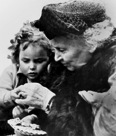
Maria Montessori was born on 31st August 1870 in the provincial town of Chiaravalle, Italy. She was the first female Italian physician, an educator and innovator, acclaimed internationally for her educational method that builds on the way children naturally learn.
She opened her first Montessori School – Casa dei Bambini or Children’s House, in Rome on the 6th January 1907. By the Autumn of 1908 there were five Case dei Bambini in Italy, four in Rome and one in Milan. Children in the Case dei Bambini made extraordinary progress and soon 5 year olds were reading the writing. News of Montessori’s new approach spread rapidly, visitors arrived to see for themselves how she was achieving such results. Within a year the Italian speaking part of Switzerland began transforming its kindergartens into Case dei Bambini and the spread of the new educational approach began.
- Respect for the Child: Children are different from adults and each other; each child is unique and deserves respect.
- The “Absorbent Mind”: The first six years of life are immensely important in terms of learning and development. During this period children have extraordinary ability to learn almost effortlessly; they “absorb” information from their environment whatever that might be.
- The “Prepared Environment”: Children learn best and become confident individuals in an environment (at home or in school) where appropriate activities are available, where they can choose their own activities, and where they can progress at their own pace using self-correcting materials. Montessori tells us to “follow the child”.
- Purposeful Work: Through meaningful activities designed so children can succeed, children create themselves. The child in essence, is asking us to “Help me do it myself”.
- The Human Potential: Education begins at birth… and never ends! If children’s developmental needs are met, children will maximise their potential, whatever they may be. Montessori extended this premise to the world as a whole, where fulfilled and well-balanced adults would begin to behave respectfully towards each other, leading eventually to a world at peace.
Maria Montessori travelled the world and wrote extensively about her child-centered approach to education. She pursued her ideals in turbulent times. But she could not avoid being caught up in world events. Travelling in India in 1940, during the outbreak of hostilities between Italy and Great Britain, Montessori was forced to live the remainder of the war in exile in India. Living through war and political upheaval inspired her to add peace education to the Montessori curriculum She was nominated for three Nobel Peace awards. At the end of the war, Montessori returned to Europe, spending her final years in Amsterdam. She died peacefully, in a friend’s garden, on the 6th May 1952.
There are now more that 22,000 Montessori Schools in more than 110 countries.